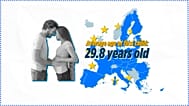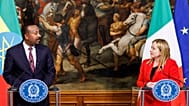The EU’s first-ever strategic framework on culture is one step closer to realisation. European Commissioner Glenn Micallef told Euronews it will be a key tool to safeguard EU culture’s role in combating division, and to tackle challenges concerning AI and artistic freedom.
The Culture Compass for Europe, a novel framework through which the European Union will take an integrated approach to culture for the first time, was adopted by the College of Commissioners on Wednesday.
 ADVERTISEMENT
ADVERTISEMENT
 ADVERTISEMENT
ADVERTISEMENT
Developed by European Commissioner for Culture, Youth and Sports Glenn Micallef, it is a forward-looking mechanism to gather insight, promote best practices, and shape future legislative priorities in the sector.
“It's the strategy that's long-awaited by the sector, by institutions, by the parliament, and by the council, but more importantly by artists,” Micallef tells Euronews in an exclusive interview following the approval of the text.
“It's a strategy that is a long-term vision of what we want to achieve in the cultural sector.”
The timing for this deliverable is apt, considering the importance it gives to safeguarding artistic freedom and the role it plays in sustaining democracy.
“When artists are free to express themselves, when they are free to artistically express their voices, then democracy has a voice,” he says. “So what we want to do is we want to strengthen artistic freedom. We want to give people the opportunity to [...] access our culture and our heritage [more easily] in Europe, because this is one of the most effective shields that we [possess] to division and extremism.”
Reports continue to emerge of attacks on artistic freedom, including censorship and undue interference, which affect the independence of cultural institutions. In the face of these threats, cultural institutions have long been calling for EU action to protect artistic expression.
One of the commitments made in the Compass is the periodical publishing of a “Report on the State of Culture in the EU”, considered the cultural counterpart to the EU’s “Rule of Law Report”.
This will be fed by an EU cultural data hub that will monitor developments and pool best practices, while progress will be tracked by an EU high-level exchange on this topic.
The Culture Compass — a mechanism to gather insight, promote best practices, and shape future legislative priorities — is expected to be approved by all three EU institutions in 2026.
AI concerns
Europe is world-renowned for its cultural heritage and diversity, yet policy-making in this field was fragmented until now. The idea of putting culture on the policy agenda gained traction last year when Commission President Ursula von der Leyen, setting out the Commission's 2024-2029 priorities, highlighted Europe's cultural diversity and heritage as important to its future.
Additionally, such an EU strategic framework for culture was requested by the European Parliament and European Council. There is also public support to bolster the bloc’s cultural landscape: a recent Eurobarometer survey on culture showed that the majority (87%) of respondents agreed that culture should have a “very important place” in the EU.
The Compass aims to ensure stronger recognition of the sector's social and economic value. “This is a sector that contributes €200 billion annually in value added to our economies,” Micallef notes.
“40% of our tourism is cultural tourism. So these are significant contributions to our societies, to our democracy, but also to our competitiveness.”
One of the major contemporary concerns that the Culture Compass addresses is the impact of Artificial Intelligence (AI). Micallef notes that digital technologies transform cultural and creative sectors and industries — specifically pointing to AI for its role in transforming cultural creation.
“We have to embrace these technologies,” he says. “In the cultural sector, these are technologies that are having a profound impact. They are a huge opportunity for the sector, but only if the conditions are right.”
The main challenge posed by these technologies is regarding copyright. Many artists have expressed frustrations about AI models being trained on copyrighted work without their permission. This has resulted in legal action being launched against companies.
Just this week, a German court ruled in a landmark case that OpenAI must pay a licensing fee to use copyrighted song lyrics in its artificial intelligence (AI) models, including ChatGPT.
Micallef pointed to the EU’s existing regulatory, legally-binding frameworks setting rules for this technology, including the Digital Services Act, the AI Act, and the Copyright Directive.
“These are tools that help in safeguarding the rights of artists and ensure that they are reimbursed if their content is going to be used. But we need to go beyond this," he says.
The Culture Compass therefore proposes to develop a new AI strategy for the cultural and creative sectors, taking into account their specific needs in its future digital policies.
The focus here will be on promoting collaboration between creatives and the digital sector, promoting the ethical use of AI, and identifying the support and adaptations needed to protect content and creators.
Culture must pay rent
Almost 8 million people are employed by cultural and creative enterprises in the EU — equating to roughly 4% of the EU’s working population — spanning a wide range of jobs. This is a share similar to the agricultural sector.
“People create culture, and there is no art, there is no culture without artists and creative professionals, and the Culture Compass makes this very clear. They are the ones who bring the cultural sector to life,” Micallef says.
Despite the sector’s significance, creatives face the pressure of precarious working conditions. Cultural work rarely offers a decent living, forcing many to work a second job to sustain themselves. Additionally, freelance work and self-employment are more common than in other sectors, while work contract durations tend to be less stable.
“Half of the people who are working in this sector say that they face poor working conditions. If we continue to allow this to happen, it will be very hard for the cultural sector to attract and retain talent,” the European Commissioner explains.
"So if we want to unlock the potential that culture can contribute to our society, but also to our economies, this must change. Culture must pay the rent.”
To improve artists' working conditions, the Compass proposes setting up an EU Artists Charter. It will not only recommend commitments for fair working conditions but also increase compliance and accountability.
“We want to kickstart that discussion immediately in December when we have the high-level round table on artists' working conditions,” he says. “Here, we will send a strong signal of our commitment to improve the situation.”














